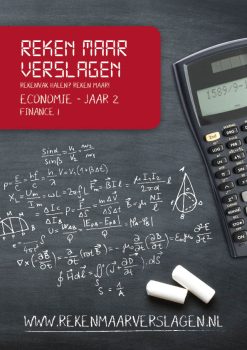No products in the basket.
< All topics
Summary Finance 1 Erasmus
Posted on
Last updated on
Need a Finance summary for studying economics at Erasmus University Rotterdam EUR? This will make the exam a breeze!
"On Sunday evening, studying for the Finance subject. Geez, I am dreading this. It's so much material I need to know and then also for all these other subjects. I just can't get through it."
Do you recognise yourself in the sentence above? Then we at Reken Maar Verslagen have the solution for you.
The subject Finance FEB12003 is one of the most difficult subjects in the Bachelor of Economics and Business Economics at Erasmus University Rotterdam, perhaps you have already experienced this yourself. Topics such as the Hirshleifer model, Net present value (NPV), portfolio theory and the valuation of bonds and shares are generally perceived as very difficult by students. Do you want to get started with these right away so you can pass your Finance exam at Erasmus University with a good grade? With a summary for the subject Finance at Erasmus University Rotterdam, you will simply pass! Read on below and we will give you some inside information.
Would you like to get started on this right now to finish your Finance exam at Erasmus University with a good grade? Then click here To order your summary Finance!
Want to know even more about Finance or get a brief introduction to the topics within the profession? Then read on below to see what's in store for you and watch the videos at the bottom of the page!
Summary Finance Erasmus University Rotterdam: basic concepts
In the Finance summary, which you here can order, the basic concepts within the subject of Finance will also be explained using examples. You may be familiar with many of these concepts from the subjects microeconomics and accounting.
In this article, we are going to go through the following basic concepts with you. If you know these well then you have already laid a super good foundation for the Finance exam:
- Key concept 1: Legal forms
- Key concept 2: Financial ratios
- Key concept 3: Hirschleifer model
- Key concept 4: Investment decision (Net present value)
- Key concept 5: Portfolio theory
We will go through them with you below.
Summary finance Erasmus Rotterdam - Core concept 1: legal forms
First, in the summary, the various legal forms such as sole proprietorship, V.O.F (general partnership), N.V. (public limited company) and B.V. (private limited company) are covered. Who is liable under which legal form? Where is there a chance of an agent-principal problem arising? What does the supervisory board (RVC) do? Who sits on the board of directors (RVB)? What is discussed at the annual general meeting (AGM)? You will find answers to these questions in the Finance Erasmus Rotterdam summary of Reken Maar Verslagen!
Summary finance Erasmus Rotterdam - Key concept 2: financial ratios
What should also not be missing from the summary Finance are the financial ratios. Financial ratios are important to analyse the financial situation of a company something you are going to learn during the Finance course here at Erasmus in Rotterdam. The most important financial ratios and calculations you will cover are:
- Market value equity
- EPS (earnings per share)
- Retained earnings
- Operating margin
- Current ratio
- Net profit margin
- Quick ratio
- Cash ratio
- Interest coverage ratio
- Debt/Equity ratio
- ROE (return on equity)
- ROA (return on assets)
To pass your exam, it is very important to do a lot of practice assignments with these ratios and to have a good understanding of what these ratios mean and what they say about the financial status of a company. In the Finance Erasmus Rotterdam summary, all ratios are explained and several example assignments are worked out step by step. Can't wait to start practising with this? Then order now here your summary finance!
Finance summary Erasmus Rotterdam - Key concept 3: Hirschleifer model
One of the first topics they will address during the Finance course at your bachelor's degree at Erasmus University is the Hirschleifer model. On the Hirschleifer model there are 2 standard exam questions, if you practice well and understand the model well, these are 2 questions you are guaranteed to get right on your exam.
First of all, the Hirschleifer model has many assumptions that can be found in the Finance Erasmus Rotterdam summary. The summary also contains a list of memorable mnemonics that you can write on your cheatsheet and take to your exam. Our advice is to copy these.
Time for a practice question! Grab pen and paper and, of course, your calculator and read along! A question that could be on the exam, for example, is:
Assume a world according to the Hirshleifer model. Danny's income at t=0 and t=1 (CF0 and CF1) is $50,000 and $51,000, respectively. Danny consumes at t=0 $45,000 the investment at t=0 (EA) equals $15,000 and yields at t=1 $25,000 (OR). The risk-free interest rate is 2%. Which of the following statements is correct?
- (a) at t=0, Danny lends $10,000
(b) at t=0, Danny borrows $10,000 from
(c) at t=0, Danny lends $5,000
(d) at t=0, Danny borrows $5,000 from
The answer to this old exam question is B. Do you want to know how to get to this answer or do you want to make more practice questions on the Hirshleifer model? Then order the summary Finance Erasmus Rotterdam via this link!
Summary finance Erasmus Rotterdam - Core concept 4: Investment decision (NPV)
Another topic that will be covered during the lectures in Rotterdam is the investment decision. This will include several questions:
- Is the investment attractive?
- How do we make a choice between investment?
- How should we choose when there is a limited budget?
To answer these questions, you will have to learn to analyse cash flows/cash flows of companies. Here, it is important to know that money in the future is worth less than money in the present. So cash flows from the future will have to be discounted to the present (video 2).
To see if an investment is valuable, we use the NPV rule (nnet present value). When the NPV > 0, we need to start investing. This immediately answers the first question asked above. Would you like the answer to the other questions or would you like to practise stating NPV or NPV? Then order the summary finance Erasmus Rotterdam here And become an expert in this part of the Finance profession!
Summary finance Erasmus Rotterdam - Core concept 5: Portfolio theory
The last topic from the summary finance Erasmus Rotterdam which we will highlight is the portfolio theory (video 3). The thrust of this topic within finance is that each investor, given his utility function, invests in the so-called efficient portfolio. An individual makes his choice based on his own utility function, which you will remember from the profession microeconomics. The corresponding assumptions of the theory are listed in the summary and you should know them by heart or write them on your cheatsheet.
The most important lesson you will learn about portfolio theory is the importance of diversification. On portfolio theory, theory questions will generally be asked on the exam, which are very similar. So make sure you practice well with these questions so you know what to expect.
Summary finance Erasmus Rotterdam: Exam structure
The Finance exam at the Erasmus School of Economics has had the same structure for years, consisting of 30 multiple-choice questions. Each subject has a fixed number of questions, which recur every year. The following topics are asked on the exam: (the number of questions on this topic is given in brackets).
- Hirshleifer model (2)
- Financial concepts (2)
- Investment decision rules (3)
- Capital budgeting (1)
- Valuing shares and bonds (2+2)
- Portfolio theory (2)
- CAPM model (2)
- APT (2)
- Performance measurements and EMH (1+2)
- Company cost of capital (7 divided into NPV, perfect market, corporate/personal tax)
- Dividend policy (2)
Summary Finance Erasmus Rotterdam, everything you need to succeed
As you have read, many different topics are raised in the Finance subject. So it is of utmost importance to practice a lot with old exam paper and also master the theory well.
The summary of Reken Maar offers you a helping hand in this. The above topics and all other subjects in the subject are discussed and explained in more detail using examples and practice exercises. Order your summaries here. On behalf of the whole of Reken Maar, we wish you good luck in preparing and taking the exam!
Do you find Finance interesting? What can you become with it?
The English term finance actually means nothing other than 'financial' in Dutch. So everything to do with finance and thus, in short, money. At Erasmus University, a distinction is made between different disciplines within finance, for example:
- Personal Finance/ household finance;
- Corporate Finance;
- Sustainable Finance;
- Public finance/ public finance;
- Financial Management.
You can therefore imagine that there is an awful lot of material to learn before you can graduate in this subject. While attending the bachelor's programme at the Erasmus University, school of Economics, in Rotterdam, you will get an introduction to the Finance world. This subject does not only focus on one direction within the Finance world but covers multiple aspects within the Finance world. You will develop a good basis for a possible future study or career in Finance during this Bachelor course in Finance, but even outside lecture hours you will often spend a lot of time mastering all the knowledge described in the books.
- Assistant financial controller
- Finance officer
- Bookkeeper
- Financial administrator
- Finance & control employee
- Financial manager
- Financial director (CFO)
- Business controller
- Financial controller
- Accounting officer
Because we speak from experience and know what it is like to complete this course successfully, we have gathered all the necessary knowledge and information to successfully complete this course in a Summary Finance specifically and only for students of the Finance programme at Erasmus University Rotterdam.

